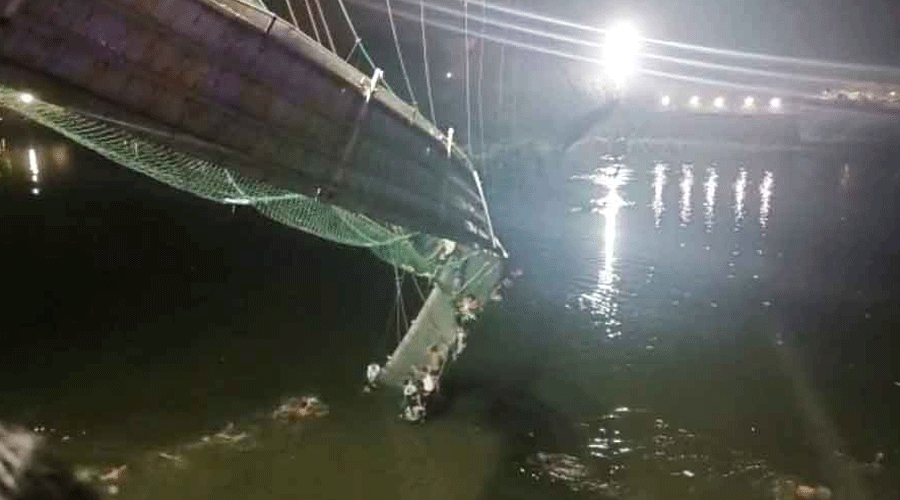What was the load capacity of the bridge? Not more than 125 people. In fact there were 400 to 500 people on the bridge that evening.
My wife’s grandfather, Maharaja Bhupinder Singhji and Dr Karan Singh’s father, Maharaja Hari Singhji were close friends. Succeeding generations of the two families have insatiably followed the tradition of cordiality.
Dr Karan Singh is a scholar, fluent in Sanskrit and three other languages. He became Sadar-I-Riyasat at the age of 18 and the youngest Central Cabinet Minister in Shrimati Indira Gandhi’s Cabinet at 37. We have known each other for decades. In my view he would have made an ideal Rashtrapati, but fate willed otherwise.
A few days ago, a little known Minister of State in Prime Minister Modi’s government made fanciful statement on Nehru’s erroneous role on Kashmir in 1947. The Minister suggested that Nehru refused to accept Maharaja Hari Singh’s wish to accede to India in June 1947—or was it April?
Dr Karan Singh, in my judgement, should have taken no notice of what the Minister of State said. A day or two later he wrote a somewhat long-winded article perhaps provoked by the Minister’s comments, in the Hindustan Times, praising his father’s role in the 1947 events in Jammu and Kashmir. With my regard for Karan Singhji, I shall refrain from commenting on it.
Two days later, the intellectual Jairam Ramesh (Sonia Gandhi’s speechwriter) produced a rejoinder in the Hindustan Times, making not so subtle fun of Maharaja Hari Singh. That should have ended the matter. Unfortunately, Karan Singhji commented on Jairam Ramesh’s article.
He termed Jairam Ramesh’s remarks as “unacceptable”. Jairam is a high class intellectual, but not yet a national eminence as Dr Karan Singh is.
Both should read chapter ten of V.P. Menon’s, “The Story of the Integration of the Indian States” and end the unseemly debate.
***
On 30 October, a horrendous manmade tragedy took place in Morbi in Gujarat. The pedestrian bridge collapsed over the river Machchhu. Over 135 people lost their lives, including women and children. The bridge was constructed by a British engineer in 1879. It was under repair for seven months, being made usable four days before the tragedy occurred at 6.30 in the evening on 30.10.2022.
The Oreva Group renovated the suspension bridge; its big shots are absconding.
The Hindustan Times on 1.11.2022 wrote, “…how a company more famous for making watches and clocks than civil engineering was given a contract to renovate the bridge.”
Why was there no crowd control? The local people were complaining that people were entering the bridge with no one to stop them, in spite of the fact that there is a ticketing system to prevent overcrowding. When the bridge collapsed, several hundred people were on it. Why was the contract given to the Oreva Group? It has been revealed that there were serious lapses in the repair work. Material from the collapsed bridge was used for repair work.
What was the load capacity of the bridge? Not more than 125 people. In fact there were 400 to 500 people on the bridge that evening. Apparently, the bridge was opened without the obligatory fitness certificate. There seems no limit to ignoring rules and regulations.
What does one say to Lok Sabha member from Rajkot, Shri Mohan Kundariya, who lost 12 relatives in the bridge tragedy? How many tears will he shed and with whom?
How long will the inquiry take? It should be time bound. The PMO should keep an eye on it.
***
Former Prime Minister of Pakistan and among the outstanding cricketers of all time, Imran Khan narrowly escaped being killed by an assassinator earlier in the week. He was leading a huge procession of his enthusiastic followers when he was fired at.
We of the subcontinent are not strangers to assassinations. Gandhiji was allergic to security, when Sardar Patel told him that after the failed bomb attack at Birla House on 20 January 1948, security arrangements were being made at Birla House to protect him. Gandhiji said, “If you do that I shall leave for Wardha tomorrow”. Ten days later, Nathuram Godse shot him.
Indira Gandhi and her son Rajiv Gandhi were both killed by assassins. Both were impatient with security arrangements to protect them.
In Pakistan, Prime Minister Liaquat Ali Khan was assassinated in 1951, Z.A. Bhutto was hanged in 1979, President Zia ul Haq was blown up in a plane in 1988, Benazir Bhutto was assassinated in 2007.
In Bangladesh, President Mujibur Rahman and his entire family were killed in 1975, except his daughter, the present Prime Minister of Bangladesh.
In Sri Lanka, President Bandaranaike was killed by a Buddhist monk, President Premadasa and my friend Gamini Dissanayake, a Presidential candidate, were blown up by bombs in 1992.
In 1963, President John F. Kennedy was assassinated in Dallas in Texas.
A chilling record. Imran Khan should be careful.

